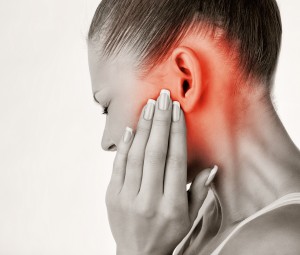 Symptoms in and around the ear are very common in patients with TMJ disorders.
Symptoms in and around the ear are very common in patients with TMJ disorders.
Tinnitus (ringing or buzzing in the ear), dizziness, earache, and vertigo are all common symptoms of a TMJ problem. If you suffer from any of these symptoms and your physician does not find a cause in the ears, it’s likely that you have a TMJ problem.
In one study, 81%-100% of these symptoms resolved when conservative treatment for TMJ was provided after their physician had a negative ear exam.
Why does TMJ affect the ear?
The inner ear is located behind the TMJ socket in your skull. If you TMJ is not centered in the socket (almost all TMJ problems begin with this structural problem); as the TMJ damage progresses, it can put pressure on the bony ear structures and cause pain, altered hearing or tinnitus, and sometimes vertigo. If moving the jaw seems to clear a stuffy ear or change the symptoms, you should have a TMJ evaluation.
Tinnitus, ringing, buzzing or sometimes stuffiness in the ear can typically be caused by muscle spasms in the TMJ muscles associated around the ear. A clicking jaw or TMJ that has a “displaced disc” that limits movement causes various muscles around the TMJ and neck to become tense. This triggers tension in the small muscles inside the ear and can cause tinnitus-like symptoms (hissing, buzzing, or stuffy ear) as well as dizziness.
Referred pain to the ear can be caused by a dislocated TMJ disc, chronic clenching (which compresses and irritates the ear structures), along with muscle spasms of the TMJ and ear.
Vertigo, dizziness, and ear pain can also co-exist with a TMJ/neck imbalance that causes the sternocleidomastoid muscle (large muscle on the side of the neck) to eventually develop areas of spasm and pain that are felt around the ear.
If you develop pain or any of these problems of the ear and your physician doesn’t find cause, it’s likely that it is a significant TMJ problem that has progressed to the point of needing treatment. General dentists are not trained to recognize symptoms of a TMJ problem affecting the ear. Find a Dentist that specializes in treating TMJ problems (not occlusal or bite problems) and schedule an evaluation. In this study it suggested that 80%-100% of the time it could be a TMJ disorder.
Otologic symptom improvement through TMD therapy : Quintessence Int. 2007 Oct;38(9):e564-71.



